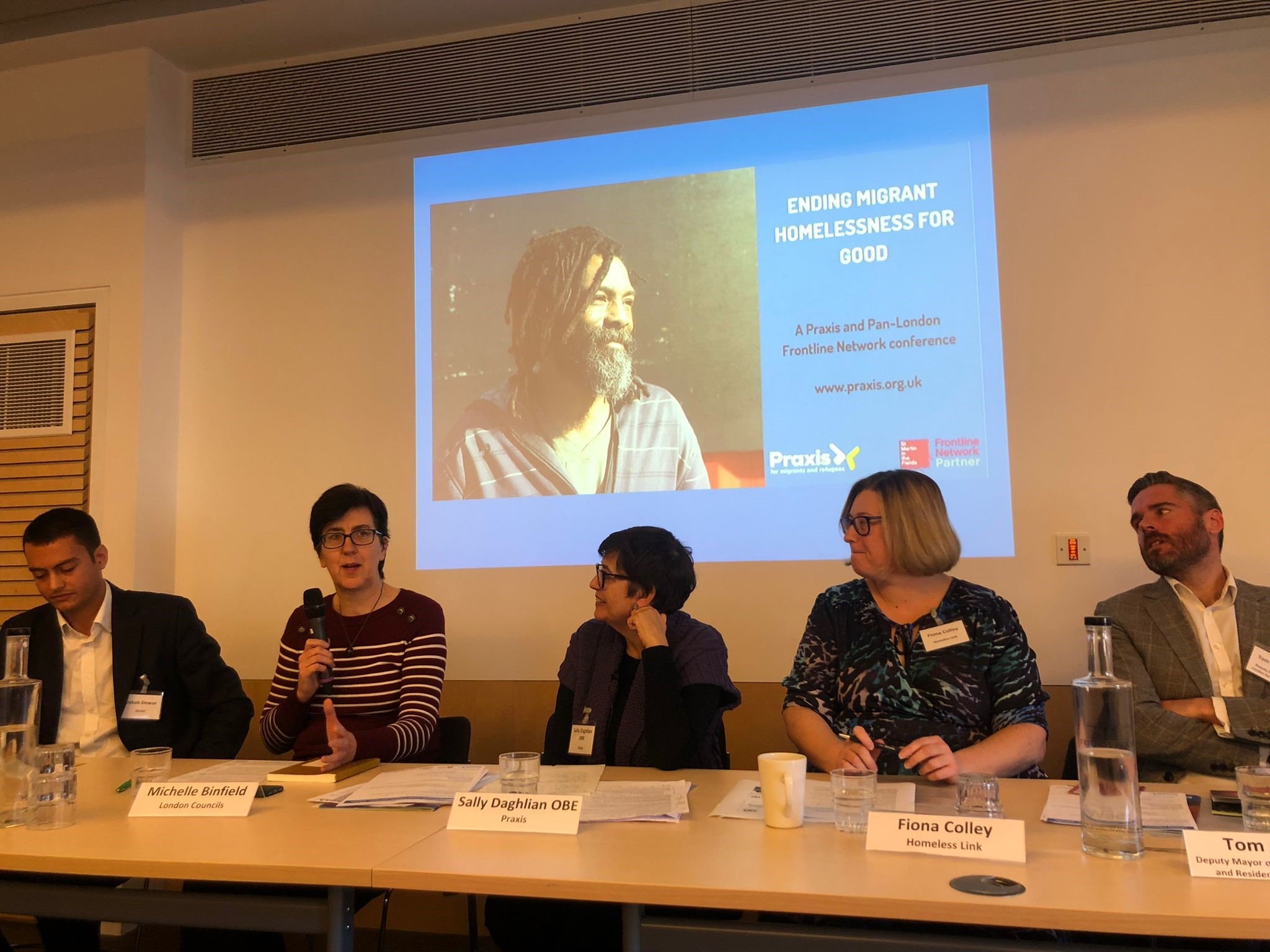WATCH AGAIN: conference on ending migrant homelessness for good
Recordings of all sessions can be watched again here.
On 16th November, almost 150 people came together for the Praxis Pan-London Migrant Frontline Network’s conference on migrant homelessness.
Coming just two months after the Government launched its new cross-departmental strategy for ending rough sleeping for good, our conference took as its starting point the question of how homelessness can truly be ended for all, for good.
Together with expert speakers and panellists from across London, we explored this question, examining how Home Office policies drive homelessness amongst migrant communities, sharing learning and good practice from recent years and promoting a new London subregional immigration advice service for rough sleepers and people at risk of homelessness.
Eight panel discussions ranged widely across this theme, exploring:
The current environment for homeless migrants, including in the wake of the Kerslake Report Review;
Local solutions to migrant homelessness, focused on the potentially transformative role of local authorities in addressing migrant homelessness;
Changes in local homelessness provision in London, including the impact of Ukrainian visa schemes;
The impact of long routes to settlement on migrant homelessness;
New developments in addressing migrant homelessness, including the relocation of the escalation routes service and the Rough Sleepers Support Service to UKVI Chief Caseworker Unit;
The dire shortcomings of asylum support, and what this means for homelessness amongst migrants;
The intersection of migrant and youth homelessness, and some of the services designed to address this issue specifically;
Homelessness amongst EU nationals, and the problems created by the EU Settlement Scheme.
Recordings of all panel discussions are available to watch again here.
Here, our Advocacy, Training and Development Manager, Bethan Lant, who has attended countless Praxis conferences on migrant homelessness over the years, reflects on what’s changed since Praxis became a Frontline Network Partner in 2016.
When I think about how far the homelessness and migrants’ rights sectors have come since Praxis became a Frontline Network Partner, there has been an enormous amount of progress in terms of how the drivers of migrant homelessness are understood and the way in which stakeholders are working together towards solutions.
At the end of this onference on migrant homelessness, we’re left with a number of key takeaways:
The kind of labels we use when talking about migrant homelessness matter. Today saw more debate about the use of No Recourse to Public Funds (NRPF) versus “restricted eligibility” – a debate which illustrates some of the complexities involved in supporting non-UK nationals experiencing homelessness. This reminds us of the importance of properly understanding a person’s immigration status and therefore what the barriers are to accessing services.
Looking at the root causes of what’s happening is essential. Homelessness, especially migrant homelessness, doesn’t happen in isolation. Today, there’s a much better level of understanding of the root causes of homelessness amongst migrant communities now, and a lot more clarity on the solutions. Work to tackle these root causes – including the policy drivers of homelessness must continue, and for this in particular it was significant to have representatives from the Home Office and the Department for Levelling Up, Housing and Communities in the room.
We need to get a lot better at planning ahead. For instance, we know that in around one year’s time, EU nationals will start coming to the end of their pre-settled status and some of them will need help to transition to settled status. We should be planning for this now. There will also be future crises like those in Afghanistan and Ukraine, which we know will trigger larger scale movements of people. We need to be looking now at what has and hasn’t worked, and setting up better systems and processes and talking to government departments and other funders about funding for the work
Partnerships continue to be critical, because none of us can solve migrant homelessness on our own. There has been real progress in terms of collaboration amongst actors working with non-UK nationals experiencing homelessness, partly driven by the pandemic. This must continue if we are to keep making progress towards ending migrant homelessness;
Finally, resourcing. We are not overwhelmed by the numbers, we’re under-resourced for the need that exists. As voluntary sector organisations, we can use resources we have creatively to make them go as far as possible. But we also need to keep pushing for more resources if we are to keep meeting the needs , especially as the cost of living crisis accelerates.
In addition to all those who came to the conference, Praxis would like to thank our partners and donors who made this event possible.




